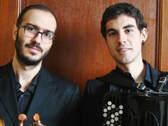Music on Thursdays - Online
Thursday 29th April 2021
Sexual Intrigue in Opera
Available: from Thursday 29th April
Guest host: Liz Barnes
Guest host: Liz Barnes
♫ ───────────────────────────────────
Programme
Sexual Intrigue in Opera
Vincenzo Salvatore Carmelo Francesco Bellini (1801-1835)
Text: Felice Romani (1788-1865)
from Norma Act I (1831)
Casta Diva Chaste Goddess
Wilhelm Richard Wagner (1813-1883)
from Tannhäuser und der Sängerkrieg auf Wartburg
Tannhäuser and the Song Contest on Wartburg (1843-45)
Pilgerchor Pilgrim’s Chorus
Richard Wagner
from Die Walküre TheValkyrie (1854-56)
Winterstürme wichen dem Wonnemond
Winter storms gave way to the Merry Moon
Giuseppe Fortunino Francesco Verdi (1813-1901)
from Rigoletto (1850-1851)
Act 3 quartet
Bella Figlia Dell'Amore
Beautiful daughter of love
Phillip Glass (b1937)
from Akhnaten Act III Scene II (1983)
Attack and Fall
Wolfgang Amadeus Mozart (1756-1791)
from Die Entführung aus dem Serail K384 (1781-82)
The Abduction from the Seraglio
Wolfgang Amadeus Mozart
from Die Zauberflöte - The Magic Flute K620 (1791)
Scene I, In diesen heil'gen Hallen Within these hallow'd halls
Aria & Chorus: Oh Isis und Osiris
Georges (Alexandre César Léopold) Bizet (1838-1875)
from Les pêcheurs de perles - The Pearl Fishers(1863)
Au fond du temple saint - Deep in the holy temple
Jacques Offenbach (1819-1880)
from Les contes d'Hoffmann The Tales of Hoffmann (1880)
Belle nuit, O nuit d'amour Night of Beauty, Night of Love (Barcarolle)
Edward Benjamin Britten (1913-1976)
from Billy Budd Op 50 (1950-51)
Gioachino Antonio Rossini (1792-1868)
from La Cenerentola - Cinderella Act 2 (1816-17)
Non piu mesta No longer sad
Sigmund Romberg (1887-1951)
from the 1954 film of operetta The Student Prince (1924)
Drink! Drink! Drink!
Text: Felice Romani (1788-1865)
from Norma Act I (1831)
Casta Diva Chaste Goddess
Wilhelm Richard Wagner (1813-1883)
from Tannhäuser und der Sängerkrieg auf Wartburg
Tannhäuser and the Song Contest on Wartburg (1843-45)
Pilgerchor Pilgrim’s Chorus
Richard Wagner
from Die Walküre TheValkyrie (1854-56)
Winterstürme wichen dem Wonnemond
Winter storms gave way to the Merry Moon
Giuseppe Fortunino Francesco Verdi (1813-1901)
from Rigoletto (1850-1851)
Act 3 quartet
Bella Figlia Dell'Amore
Beautiful daughter of love
Phillip Glass (b1937)
from Akhnaten Act III Scene II (1983)
Attack and Fall
Wolfgang Amadeus Mozart (1756-1791)
from Die Entführung aus dem Serail K384 (1781-82)
The Abduction from the Seraglio
Wolfgang Amadeus Mozart
from Die Zauberflöte - The Magic Flute K620 (1791)
Scene I, In diesen heil'gen Hallen Within these hallow'd halls
Aria & Chorus: Oh Isis und Osiris
Georges (Alexandre César Léopold) Bizet (1838-1875)
from Les pêcheurs de perles - The Pearl Fishers(1863)
Au fond du temple saint - Deep in the holy temple
Jacques Offenbach (1819-1880)
from Les contes d'Hoffmann The Tales of Hoffmann (1880)
Belle nuit, O nuit d'amour Night of Beauty, Night of Love (Barcarolle)
Edward Benjamin Britten (1913-1976)
from Billy Budd Op 50 (1950-51)
Gioachino Antonio Rossini (1792-1868)
from La Cenerentola - Cinderella Act 2 (1816-17)
Non piu mesta No longer sad
Sigmund Romberg (1887-1951)
from the 1954 film of operetta The Student Prince (1924)
Drink! Drink! Drink!
Concert duration: 57 minutes
♫ ───────────────────────────────────
|
We need your help to fund our concerts recorded 'as live' by professional musicians |
♫ ───────────────────────────────────
Sexual Intrigue in Opera
Dear Listeners,
What inspired me to put together these extracts of operas is generally my love of opera, and specifically upon watching a film called Quartet, (director Dustin Hoffman), about a home for retired opera singers. The title refers to the famous quartet in Rigoletto that we hear later, starring super tenor Pavarotti.
We will go through a repertoire of emotions, starting in a sombre mood about death and suffering, ending up with joy and happiness, and much in between like hardship, love, jealousy, and desire.
In Bellini's Norma the action takes place in Gaul under the Roman occupation, and is centred on the love triangle between Pollione, the Roman proconsul of Gaul, Norma, his former companion, and the young Adalgisa.
Norma, high priestess of the Druid temple, who had two children by Pollione, breaking her Druid chastity vows, discovers that her lover is now in love with her friend, the young Druid priestess Adalgisa. Norma tries to convince Pollione to give up Adalgisa and return to her, but he refuses.
Norma publicly confesses her sin with Pollione and is sentenced to death by fire. Pollione is convicted for pursuing Adalgisa in the temple and goes to the stake with Norma.
Greek American soprano Maria Callas’ private life was almost as dramatic as her performances on stage. Private letters reveal that shipping magnate Aristotle Onassis – who was married to Jackie Kennedy and with whom Callas had a long-running affair – physically threatened the singer. He allegedly drugged her, mostly for sexual reasons – today we would class this as date rape. Her husband robbed her of half of her money. She once lost a teaching job for rejecting advances from the school’s president. Her mother sold stories to the press and blackmailed her; her father tried to extort money from her by pretending to be seriously ill and penniless.
She died in 1977 in Paris of a heart attack, aged 54. Some say she died of a broken heart.
What inspired me to put together these extracts of operas is generally my love of opera, and specifically upon watching a film called Quartet, (director Dustin Hoffman), about a home for retired opera singers. The title refers to the famous quartet in Rigoletto that we hear later, starring super tenor Pavarotti.
We will go through a repertoire of emotions, starting in a sombre mood about death and suffering, ending up with joy and happiness, and much in between like hardship, love, jealousy, and desire.
In Bellini's Norma the action takes place in Gaul under the Roman occupation, and is centred on the love triangle between Pollione, the Roman proconsul of Gaul, Norma, his former companion, and the young Adalgisa.
Norma, high priestess of the Druid temple, who had two children by Pollione, breaking her Druid chastity vows, discovers that her lover is now in love with her friend, the young Druid priestess Adalgisa. Norma tries to convince Pollione to give up Adalgisa and return to her, but he refuses.
Norma publicly confesses her sin with Pollione and is sentenced to death by fire. Pollione is convicted for pursuing Adalgisa in the temple and goes to the stake with Norma.
Greek American soprano Maria Callas’ private life was almost as dramatic as her performances on stage. Private letters reveal that shipping magnate Aristotle Onassis – who was married to Jackie Kennedy and with whom Callas had a long-running affair – physically threatened the singer. He allegedly drugged her, mostly for sexual reasons – today we would class this as date rape. Her husband robbed her of half of her money. She once lost a teaching job for rejecting advances from the school’s president. Her mother sold stories to the press and blackmailed her; her father tried to extort money from her by pretending to be seriously ill and penniless.
She died in 1977 in Paris of a heart attack, aged 54. Some say she died of a broken heart.
|
|
Vincenzo Salvatore Carmelo Francesco Bellini (1801-1835) Text: Felice Romani (1788-1865) from Norma Act I (1831) Casta Diva Chaste Goddess (5m45) sung by Maria Callas with Orchestra della RAI, Rome, 31.12.57 |
♫ ───────────────────────────────────
No operatic concert should be without the mighty Richard Wagner. Here we have a wonderful chorus from the opera Tannhäuser:
|
|
Wilhelm Richard Wagner (1813-1883) from Tannhäuser und der Sängerkrieg auf Wartburg Tannhäuser and the Song Contest on Wartburg (1843-45) Pilgerchor Pilgrim’s Chorus (6m20) Marko Munih conducting the Ljubljana Radio Symphony Orchestra and Choir |
♫ ───────────────────────────────────
Shall we stay with Richard for a little while longer?
This is a piece from Valkyrie, part of the Ring of the Nibelung (the others are Rheingold, Siegfried, and Gőtterdämmerung – Twilight of the Gods). The whole of the Ring lasts around 15 hours!
The scale and scope of the story is epic. It follows the struggles of gods, heroes, and several mythical creatures over the eponymous magic ring that grants domination over the entire world.
This is a piece from Valkyrie, part of the Ring of the Nibelung (the others are Rheingold, Siegfried, and Gőtterdämmerung – Twilight of the Gods). The whole of the Ring lasts around 15 hours!
The scale and scope of the story is epic. It follows the struggles of gods, heroes, and several mythical creatures over the eponymous magic ring that grants domination over the entire world.
|
|
Richard Wagner from Die Walküre TheValkyrie (1854-56) Winterstürme wichen dem Wonnemond (3m35) Winter storms gave way to the Merry Moon performed by Jonas Kaufmann (Siegfried), with the Metropolitan Opera Orchestra, conductor James Levine, at the Metropolitan Opera House, New York, May 2011 |
♫ ───────────────────────────────────
We are coming to the piece that for me encapsulates what opera is about.
In the 3rd act, Rigoletto and his daughter Gilda arrive outside a house. The Duke's voice can be heard from inside, singing La donna è mobile - Woman is fickle. Maddalena has lured the Duke to the house. Rigoletto and Gilda listen from outside as the Duke (whom she loves) flirts with Maddalena. Gilda laments that the Duke is unfaithful; Rigoletto assures her that he is arranging revenge. Bella figlia dell'amore - Beautiful daughter of love is sung by all from inside and outside the house. In the end, (spoiler alert!), this being opera, there is a death, and yes it is our heroine Gilda.
A father sings for his love to his daughter, a daughter sings about her sorrow, a duke sings for desire, a woman sings for her amusement ...... four different emotions come together to make such a wonderful quartet, by the genius of Verdi. If you want intrigue it doesn't come much better than this.
In the 3rd act, Rigoletto and his daughter Gilda arrive outside a house. The Duke's voice can be heard from inside, singing La donna è mobile - Woman is fickle. Maddalena has lured the Duke to the house. Rigoletto and Gilda listen from outside as the Duke (whom she loves) flirts with Maddalena. Gilda laments that the Duke is unfaithful; Rigoletto assures her that he is arranging revenge. Bella figlia dell'amore - Beautiful daughter of love is sung by all from inside and outside the house. In the end, (spoiler alert!), this being opera, there is a death, and yes it is our heroine Gilda.
A father sings for his love to his daughter, a daughter sings about her sorrow, a duke sings for desire, a woman sings for her amusement ...... four different emotions come together to make such a wonderful quartet, by the genius of Verdi. If you want intrigue it doesn't come much better than this.
|
|
Giuseppe Fortunino Francesco Verdi (1813-1901) from Rigoletto (1850-1851) Act 3 quartet: Bella Figlia Dell Amore (5m55) Beautiful daughter of love sung by Luciano Pavarotti, Joan Sutherland, Isola Jones, Leo Nucci |
♫ ───────────────────────────────────
We now travel across the Pond to the USA, to meet American composer Philip Glass.
This opera deals with an ancient Egyptian pharaoh reigning c1353–1336 BC, the tenth ruler of the Eighteenth Dynasty. He is famous for changing the traditional religion of Egypt from the worship of many gods to the worship of a single god named Aten, the sun's disk (hence his assumed name, Akhenaten, (Amenhotep IV) meaning “beneficial to Aten”). He was married to queen Nefertiti.
This opera deals with an ancient Egyptian pharaoh reigning c1353–1336 BC, the tenth ruler of the Eighteenth Dynasty. He is famous for changing the traditional religion of Egypt from the worship of many gods to the worship of a single god named Aten, the sun's disk (hence his assumed name, Akhenaten, (Amenhotep IV) meaning “beneficial to Aten”). He was married to queen Nefertiti.
♫ ───────────────────────────────────
There is of course a vast choice of Mozart operas, and it was quite difficult for me to choose one, but here it is.
The plot concerns the attempt of the hero Belmonte, assisted by his servant Pedrillo, to rescue his beloved Konstanze from the Seraglio of Pasha Selim. The work premiered on 16 July 1782 at the Vienna Burgtheater, with the composer conducting. Here we have a light-hearted version from the 1984 film Amadeus which follows a fictional rivalry between Mozart and Italian composer Antonio Salieri at the court of Emperor Joseph II.
The complexity of Mozart's work plays a role in a well-known tale about the opera which appeared in the early (1798) biography of Mozart by Niemetschek. In the version of the anecdote printed in Bartlett's Book of Anecdotes, the story is told like this: The Emperor Joseph II commissioned the creation of The Abduction from the Seraglio, but when he heard it, he complained to Mozart, "That is too fine for my ears – there are too many notes." Mozart replied, "There are just as many notes as there should be".
The plot concerns the attempt of the hero Belmonte, assisted by his servant Pedrillo, to rescue his beloved Konstanze from the Seraglio of Pasha Selim. The work premiered on 16 July 1782 at the Vienna Burgtheater, with the composer conducting. Here we have a light-hearted version from the 1984 film Amadeus which follows a fictional rivalry between Mozart and Italian composer Antonio Salieri at the court of Emperor Joseph II.
The complexity of Mozart's work plays a role in a well-known tale about the opera which appeared in the early (1798) biography of Mozart by Niemetschek. In the version of the anecdote printed in Bartlett's Book of Anecdotes, the story is told like this: The Emperor Joseph II commissioned the creation of The Abduction from the Seraglio, but when he heard it, he complained to Mozart, "That is too fine for my ears – there are too many notes." Mozart replied, "There are just as many notes as there should be".
|
|
Wolfgang Amadeus Mozart (1756-1791) from Die Entführung aus dem Serail K384 (1781-82) The Abduction from the Seraglio (3m35) performed by Suzanne Murphy (uncredited) for the actress Elizabeth Berridge (Konstanze), with Sir Neville Marriner conducting The Academy of St Martin in the Fields |
If you would rather hear a more serious version of the Serail than the one in Amadeus, I recommend the overture by the Wiener Symphoniker:
|
|
Wolfgang Amadeus Mozart (1756-1791) from Die Entführung aus dem Serail K384 (1781-82) Overture (5m35) performed by Wiener Symphoniker (Vienna Symphonic), Fabio Luisi, conductor, during their 2006 tour of Japan |
♫ ───────────────────────────────────
I don’t think one Mozart piece is enough, so if you like to listen to a bass singer then you will certainly enjoy the following aria. Male listeners (or possibly female) might want to test their voices and join in. I have helpfully supplied the lyrics.
|
|
Wolfgang Amadeus Mozart from Die Zauberflöte - The Magic Flute K620 (1791) Scene I, Aria & Chorus: Oh Isis und Osiris (2m40) performed by Milcho Borovinov, bass, with the Tel Aviv Philharmonic Choir Leonti Wolf, music director, and The Herzliya Chamber Orchestra Harvay Bordowitz, conductor |
|
SARASTRO O Isis und Osiris schenket Der Weisheit Geist dem neuen Paar! Die ihr der Wandrer Schritte lenket, Stärkt mit Geduld sie in Gefahr. CHOR Stärkt mit Geduld sie in Gefahr. SARASTRO Lasst sie der Prüfung Früchte sehen. Doch sollten sie zu Grabe gehen, So lohnt der Tugend kühnen Lauf, Nehmt sie in euern Wohnsitz auf. CHOR Nehmt sie in euern Wohnsitz auf. |
SARASTRO O Isis and Osiris, bestow the spirit of wisdom on this young couple! You who guide the wanderers' steps, strengthen them with patience in danger. CHORUS Strengthen them with patience in danger. SARASTRO Let them see the fruits of trial; yet if they should go to their deaths, then reward the bold course of virtue: receive them into your abode. CHORUS Receive them into your abode. |
Or perhaps you prefer this version with the German bass Kurt Moll singing Within these hallow'd halls, before Oh Iris und Osiris.
|
|
Wolfgang Amadeus Mozart from Die Zauberflöte - The Magic Flute K620 (1791) Scene I, In diesen heil'gen hallen Within these hallow'd halls Aria & Chorus: Oh Isis und Osiris (starts at 4:30) performed by Kurt Moll, bass at New York's Metropolitan Opera |
♫ ───────────────────────────────────
The following duet is from The Pearl Fishers by French composer Bizet.
The story of The Pearl Fishers revolves around a love triangle between Zurga, the leader of a fishing village, his old friend Nadir, and the priestess Leïla. ... In their famous duet, they pledge to never let their friendship be threatened again.
The story of The Pearl Fishers revolves around a love triangle between Zurga, the leader of a fishing village, his old friend Nadir, and the priestess Leïla. ... In their famous duet, they pledge to never let their friendship be threatened again.
|
|
Georges (Alexandre César Léopold) Bizet (1838-1875) from Les pêcheurs de perles - The Pearl Fishers(1863) Au fond du temple saint - Deep in the holy temple (6m40) performed by Bryn Terfel and Roberto Alagna for James Levine's 25th Anniversary at New York's Metropolitan Opera |
♫ ───────────────────────────────────
If you don’t usually watch the videos while listening, I recommend you watch this one, it’s quite different!
In the 3rd act of The Tales of Hoffmann, The Lost Reflection, we are in a gallery in a palace in Venice. Hoffmann falls in love with the courtesan Giulietta, and thinks she returns his affections, but Giulietta is not in love with Hoffmann, but seducing him under the orders of Captain Dapertutto, who promises her a diamond if she steals Hoffmann's reflection from a mirror. The jealous Schlemil, a previous victim of Giulietta and Dapertutto (he gave Giulietta his shadow), challenges the poet to a duel, but is killed, thanks to the magic sword which Hoffmann was supplied with by Dapertutto. Meanwhile, Hoffmann meets Giulietta, and cannot resist her: he gives her his reflection, only to be abandoned by the courtesan. Hoffmann searches for Giulietta, only to see her in a passing gondola, in the arms of her new lover.
In this scene we have that fascinating operatic habit, cross-dressing. If men usually dress as women for comic purposes, then women dressed as men have more serious intent. This female to male cross-dressing was partly because the high-voiced castratos of the day made audiences expect the hero to have a high voice. And here we have another conundrum, which runs all the way through opera: a love scene between two female singers, one playing a man. This doesn’t seem to be much of a problem nowadays, but what did audiences make of it 200 or so years ago?
In the 3rd act of The Tales of Hoffmann, The Lost Reflection, we are in a gallery in a palace in Venice. Hoffmann falls in love with the courtesan Giulietta, and thinks she returns his affections, but Giulietta is not in love with Hoffmann, but seducing him under the orders of Captain Dapertutto, who promises her a diamond if she steals Hoffmann's reflection from a mirror. The jealous Schlemil, a previous victim of Giulietta and Dapertutto (he gave Giulietta his shadow), challenges the poet to a duel, but is killed, thanks to the magic sword which Hoffmann was supplied with by Dapertutto. Meanwhile, Hoffmann meets Giulietta, and cannot resist her: he gives her his reflection, only to be abandoned by the courtesan. Hoffmann searches for Giulietta, only to see her in a passing gondola, in the arms of her new lover.
In this scene we have that fascinating operatic habit, cross-dressing. If men usually dress as women for comic purposes, then women dressed as men have more serious intent. This female to male cross-dressing was partly because the high-voiced castratos of the day made audiences expect the hero to have a high voice. And here we have another conundrum, which runs all the way through opera: a love scene between two female singers, one playing a man. This doesn’t seem to be much of a problem nowadays, but what did audiences make of it 200 or so years ago?
|
|
Jacques Offenbach (1819-1880) from Les contes d'Hoffmann The Tales of Hoffmann (1880) Belle nuit, O nuit d'amour Night of Beauty, Night of Love (Barcarolle) (3m20) performed by Kate Lindsey & Christine Rice |
♫ ───────────────────────────────────
We jump forward once more to the 20th century.
The innocent must be destroyed; Swedish premiere for Britten's heart-rending drama Billy Budd. Peter Mattei is making a special appearance for us in the title role.
It is a tale of a human's right to rebel, and psychological power struggles within a male-dominated hierarchy -- Billy Budd only has roles for men. In the original libretto, Billy Budd takes place on a ship. Handsome young sailor Billy arouses everyone's sympathies -- as well as desire in some cases -- and is falsely accused of mutiny. He is in a weak position, partly because of his stammer which makes it hard for him to express himself when agitated. He cannot adequately defend himself, and is sentenced to death.
In this production director Richard Jones has set the story in an English boarding school, with its tendency for bullying and underlying sexual tension.
The innocent must be destroyed; Swedish premiere for Britten's heart-rending drama Billy Budd. Peter Mattei is making a special appearance for us in the title role.
It is a tale of a human's right to rebel, and psychological power struggles within a male-dominated hierarchy -- Billy Budd only has roles for men. In the original libretto, Billy Budd takes place on a ship. Handsome young sailor Billy arouses everyone's sympathies -- as well as desire in some cases -- and is falsely accused of mutiny. He is in a weak position, partly because of his stammer which makes it hard for him to express himself when agitated. He cannot adequately defend himself, and is sentenced to death.
In this production director Richard Jones has set the story in an English boarding school, with its tendency for bullying and underlying sexual tension.
|
|
Edward Benjamin Britten (1913-1976) from Billy Budd Op 50 (1950-51) (3m05) performed by Peter Mattei with Göteborg Opera Male Chorus and Göteborg Opera Orchestra, at the Frankfurt Opera House |
♫ ───────────────────────────────────
As mentioned at the beginning we want to end on a happy note. This is well reflected in the penultimate piece.
This version of the Cinderella story may not have any enchanted mice or pumpkins, but there's plenty of magic in the music. Cinderella has silently suffered the abuse of her stepfather and stepsisters, but in true fairy tale fashion, her fate changes for the better and all is made right by the triumph of goodness over evil. In this finale, she looks ahead to a future with no more sadness.
Rossini apparently had a wicked sense of humour; here are two of his quotes:
Give me a laundry-list and I'll set it to music.
One can't judge Wagner's opera Lohengrin after a first hearing, and I certainly don't intend to hear it a second time.
This version of the Cinderella story may not have any enchanted mice or pumpkins, but there's plenty of magic in the music. Cinderella has silently suffered the abuse of her stepfather and stepsisters, but in true fairy tale fashion, her fate changes for the better and all is made right by the triumph of goodness over evil. In this finale, she looks ahead to a future with no more sadness.
Rossini apparently had a wicked sense of humour; here are two of his quotes:
Give me a laundry-list and I'll set it to music.
One can't judge Wagner's opera Lohengrin after a first hearing, and I certainly don't intend to hear it a second time.
|
|
Gioachino Antonio Rossini (1792-1868) from La Cenerentola - Cinderella Act 2 (1816-17) Non piu mesta No longer sad (3m15) performed by Cecilia Bartoli at the Metropolitan Opera, New York, in 1997 |
♫ ───────────────────────────────────
For our last piece we are celebrating the 100th anniversary of the birth of Mario Lanza, an American tenor who lived 1921-1959. For this occasion I suggest you pour yourself a nice drink and dance around the room (no spilling please).
The Student Prince opened on December 2, 1924, at Jolson's 59th Street Theatre on Broadway. The show was the most successful of Romberg's works, running for 608 performances, the longest-running Broadway show of the 1920s. The Drinking Song, with its rousing chorus of Drink! Drink! Drink! was especially popular with theatre-goers in 1924, as the United States was in the midst of Prohibition.
Sadly Mario Lanza had an eating and drinking addiction and died in a clinic trying to lose weight for a new film.
Still, enjoy his music, and Cheers!
The Student Prince opened on December 2, 1924, at Jolson's 59th Street Theatre on Broadway. The show was the most successful of Romberg's works, running for 608 performances, the longest-running Broadway show of the 1920s. The Drinking Song, with its rousing chorus of Drink! Drink! Drink! was especially popular with theatre-goers in 1924, as the United States was in the midst of Prohibition.
Sadly Mario Lanza had an eating and drinking addiction and died in a clinic trying to lose weight for a new film.
Still, enjoy his music, and Cheers!
|
|
Sigmund Romberg (1887-1951) from the 1954 film of operetta The Student Prince (1924) Drink! Drink! Drink! (2m10) performed by Edmund Purdom, and Mario Lanza (vocals) |
♫ ───────────────────────────────────
We hope you have enjoyed Liz Barnes's
Sexual Intrigue Selection for
Music on Thursdays
Watch your email and this website for news of next Thursday's (6th May)
Buck Brass Trio concert
recorded 'as live' for Leatherhead's Music on Thursdays
We continue with weekly video selection concerts until the end of June
with hopes of going live at Leatherhead Methodist Church from July 1st
The first Thursdays in May and June will be
special 'as live' recordings for
Music on Thursdays
6th May: Buck Brass Trio ♦ 3rd June: Iñigo Mikeleiz Berrade, accordion
comments welcome: [email protected]
Sexual Intrigue Selection for
Music on Thursdays
Watch your email and this website for news of next Thursday's (6th May)
Buck Brass Trio concert
recorded 'as live' for Leatherhead's Music on Thursdays
We continue with weekly video selection concerts until the end of June
with hopes of going live at Leatherhead Methodist Church from July 1st
The first Thursdays in May and June will be
special 'as live' recordings for
Music on Thursdays
6th May: Buck Brass Trio ♦ 3rd June: Iñigo Mikeleiz Berrade, accordion
comments welcome: [email protected]
|
▼ last week's selection ▼
|
▼ next week's selection ▼
|
♫ ───────────────────────────────────
We need your help to fund our concerts recorded 'as live' by professional musicians
|
► Did you listen ?
►Did you remember to give afterwards ? Here is a further chance to do so If the concerts cover their costs we will be able to do more. Please donate now ! Many thanks to those who have donated already. You set us all a great example ! |
♫ ───────────────────────────────────
Apr 1st
|
Feb 25th
|
Oct 15th
|
Oct 8th
|
Oct 1st
|
♫ ───────────────────────────────────────
♫ ───────────────────────────────────────
♫ ───────────────────────────────────────
♫ ───────────────────────────────────────































